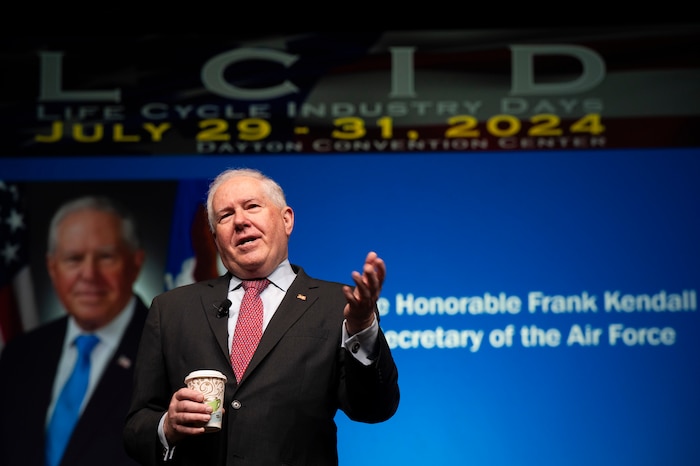"The strategic environment we're in today is the toughest that I've ever seen," expressed Secretary of the Air Force Frank Kendall during his keynote address to the Life Cycle Industry Days crowd, July 30, in Dayton.
During his introduction, it was noted that Kendall has worked in government for 50 years. This helped make his opening statement about the current military environment even more powerful.
Overarching topics of Kendall's address included:
Engineering management and defense acquisition,
Space security, with progress made and challenges ahead,
Developing new aircraft and air defense systems,
USAF modernization, budget allocations and managing sustainment costs,
Optimizing USAF resources - especially personnel, and
Partnerships with allies and industry partners.
Kendall discussed the Department of the Air Force's approach to modernization, including the stand-up of the Integrated Development Office and Air Force Information Dominance Systems Center; the importance of staying ahead of the curve with technology and innovation; and the need to reorient the military to address Great Power Competition. Additionally, Kendall emphasized the importance of modernizing the nuclear force and staying competitive in the face of evolving threats.
Opting to talk more casually and eschewing his scripted remarks, Kendall gave an overview of the progress on his Operational Imperatives, including GPC. Speed is always top of his mind, noting "… we'd like to go faster. We'd like to get a wider spectrum of capabilities out there."
Kendall also said he made one of his best personnel decisions ever in hiring Brig. Gen. Luke Cropsey as Air Force integrating program executive officer for Command, Control, Communications and Battle Management.
Cropsey is building integrated capabilities for the Air Force and Space Force with the goal of connecting joint programs and international partners. Cropsey is well known to the Air Force Life Cycle Management Center family as he previously served as director of the Air Force Security Assistance and Cooperation Directorate.
Kendall spent a few minutes addressing the challenges surrounding technology. He noted the Air Force has too much "tech debt" or reliance on obsolete technology.
"It's no mystery [our] information systems are being attacked," Kendall said. "Information systems are possible vulnerabilities that can be tapped and it's no mystery that they're being attacked. It's no mystery that cyber attackers are beefing up their techniques."
Pivoting to uniformed and civilian Airmen, Kendall spent time emphasizing the importance of creating a competitive ecosystem, with a focus on operational problem-solving and integration across different organizations beyond just those in the U.S. Air Force. Achieving those goals will take human capital investment.
"We have to grow our people. We're going to make sure they get the right training and we're going to need more people who are really, truly, as proficient as possible and have a really good set of experiences to do effective management." Secretary of the Air Force Frank Kendall
Before taking a few questions from the audience, Kendall emphasized the importance of increased funding for the Space Force, noting the newest military branch requires transformation to keep up with pacing challenges.
"If you are targeted in space, you're not going to survive," Kendall explained. "And we have got to do something about that. And if we can't target from space, we will not be successful. It's as simple as that," Kendall said.
LCID continues this week with PEO "one-on-one" sessions with industry.
View here for more PEO information.







